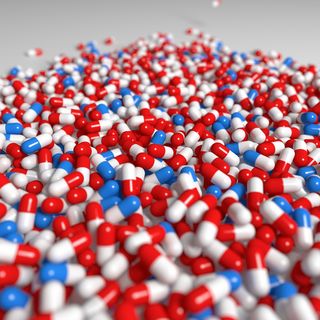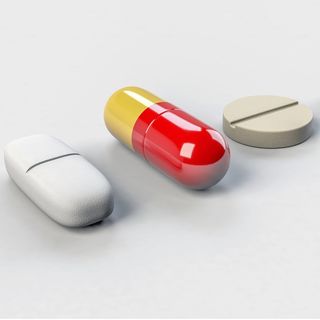SSRIs
Can We Better Predict Whether an Antidepressant Will Work?
Antidepressant-related changes in cognition may occur before changes in mood.
Posted January 10, 2019 Reviewed by Davia Sills

Antidepressants do not work for everyone. To determine if antidepressants work for an individual, the patient may need to try several. Even when an antidepressant is effective, it can take a month or two before the person begins to feel better.
Therefore, the process of finding the right antidepressant can involve months of trying new medications (and enduring side effects). But there might be a quicker way to predict antidepressant responsiveness (i.e., whether an antidepressant will work).
A new study, published in the November issue of Behavioural Brain Research, suggests that positive changes in cognition (i.e., thinking and processing of information) may predict antidepressant responsiveness.1
Before examining the findings of this study, I will briefly describe major depressive disorder and its pharmacological treatment.
Major depressive disorder and antidepressant treatment
Depression
Major depressive disorder is a prevalent mental illness associated with depressed mood, lack of pleasure in previously enjoyable activities, trouble concentrating, restlessness, slowing of movements, thoughts of death or suicide, reduced energy, and major changes in weight/appetite and sleep.2
Depression is commonly treated with drugs referred to as antidepressants.
Common antidepressants include sertraline (Zoloft), citalopram (Celexa), fluoxetine (Prozac), paroxetine (Paxil), escitalopram (Lexapro), venlafaxine (Effexor), bupropion (Wellbutrin), duloxetine (Cymbalta), and trazodone (Desyrel).
How do antidepressants work?
Most popular antidepressants belong to a class of drugs called selective serotonin reuptake inhibitors (SSRIs). SSRIs work by inhibiting the reabsorption of serotonin—a chemical messenger linked to mood, sleep, appetite, etc.
It appears that by preventing the re-uptake of serotonin, SSRI antidepressants increase serotonin availability in the synaptic region (see the video below) and improve various mental and bodily functions.
How do health professionals select antidepressants for patients?
Selecting the right antidepressant is often a matter of trial-and-error. The patient is required to take an antidepressant for 4 to 6 weeks; if no significant improvement is observed, a new antidepressant is prescribed.
However, this method of “medication selection contributes to treatment failure and unnecessarily exposes patients to lengthy and insufficient treatment trials, prolonging patient morbidity and risk for suicide.”1
Antidepressant responsiveness and cognition
Is there a more effective method of determining antidepressant responsiveness, aside from trial-and-error?
Perhaps. According to previous research, antidepressant-responsive patients experience not only a better mood but also better cognition (e.g., thinking, memory, attention).
The link between antidepressant responsiveness and improved cognition makes sense: Major depressive disorder is associated with cognitive dysfunction (such as problems with attention and memory). Therefore, as depression lifts, one expects these functions would recover too.
Might cognition improve before mood does? That is the question the new study attempted to answer.
To investigate whether early cognitive outcomes were predictive of responsiveness to antidepressants, Park and colleagues reviewed research on cognitive outcomes associated with antidepressant interventions in depressed people.
Of 339 articles identified (after a search of multiple databases), 19 met the inclusion criteria for a more detailed examination, and seven were chosen for this review.
In one of the studies, the researchers noted that compared to non-depressed brains, depressed brains showed greater activation in response to fearful (as opposed to happy) faces before the treatment. This was as expected. However, after taking an antidepressant for just seven days, those depressed participants who later showed a clinical response to the antidepressant were already demonstrating a greater reduction in brain activation when exposed to frightened faces. So change in cognitive processing of emotional information was predictive of response to antidepressants. 3
In their analysis of this and the other six studies reviewed, Park et al. observed a fairly consistent link between antidepressant responsiveness and early improvement in cognition.
Cognitive changes as predictive of antidepressant responsiveness
Why might improvements in thinking processes occur before ones involving emotions and mood?
Some theorists believe that positive changes in cognition (e.g., reduction in thinking errors) slowly translate to improved mood, but only in the context of social interactions.
Consider a depressed individual who naturally notices and recalls mainly rejections—and concludes that she is worthless. When she has a positive response to an antidepressant, she can process information more accurately. For instance, when an individual is unfriendly toward her, she does not automatically assume that her worthlessness is the reason. Perhaps the other person is not a friendly individual by nature, is tired, is not feeling well, or misunderstood her intentions.
Processing information more accurately could, therefore, make her feel better about herself and her relationships and slowly improve her mood.

Other cognitive processes related to antidepressant responsiveness
Not all studies reviewed by the authors found a connection between antidepressant responsiveness and the same type of cognitive function (e.g., enhanced facial emotion recognition). Sometimes, a different function, such as improved memory or processing speed, was predictive of antidepressant responsiveness.
To explain these inconsistent findings, let us consider the “resource allocation hypothesis.”
According to this hypothesis, depressed individuals experience cognitive dysfunction because their mental resources are exhausted. They use most of their mental resources for processing negative information (e.g., rumination).
When depression lifts, it frees up all mental resources. There is no reason the freed-up resources should be used only for emotion recognition. So antidepressant responsiveness may be associated with improvement in any mental function—be it processing speed, spatial memory, etc.
***
In summary, the review found that antidepressant responsiveness in people with depression may be linked to early improvement in thinking ability. Determining whether an antidepressant treatment will work by having the patient do a short cognitive test soon after beginning treatment may “help minimize unnecessary drug exposure, lessen suffering, limit resource use, and allow for earlier initiation of a treatment adaptation.”
References
1. Park, C., Pan, Z., Brietzke, E., Subramaniapillai, M., Rosenblat, J. D., Zuckerman, H…, McIntyre, R. S. (2018). Predicting antidepressant response using early changes in cognition: A systematic review. Behavioural Brain Research, 353, 154-160.
2. American Psychiatric Association. (2013). Diagnostic and statistical manual of mental disorders (5th ed.). Arlington, VA: Author.
3. Godlewska, B. R., Browning, M., Norbury, R., Cowen, P. J., and Harmer, C. J. (2016). Early changes in emotional processing as a marker of clinical response to SSRI treatment in depression. Translational Psychiatry, 6, e957.




